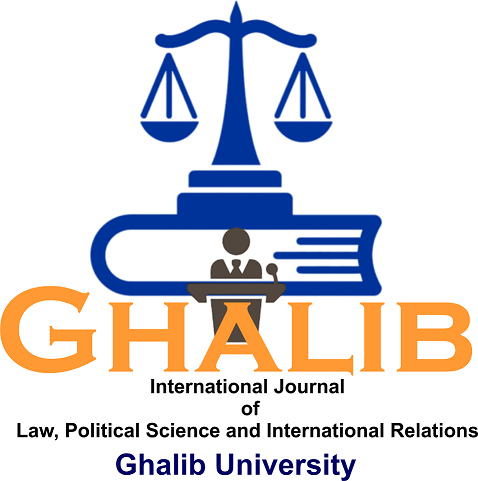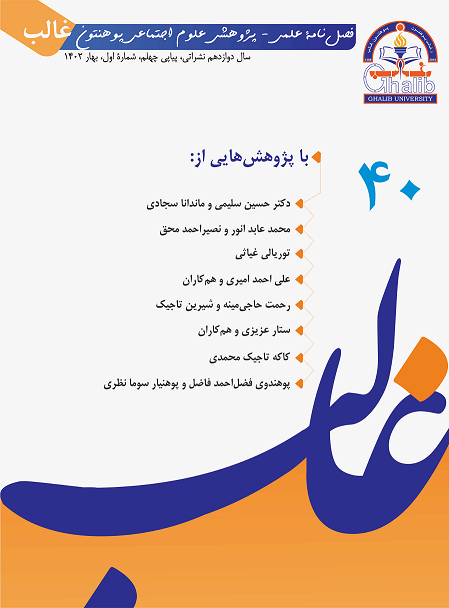تبارشناسی مفهوم وراثت و بازتاب آن بر نژادگرایی جریان اندیشهورزی در روابط بینالملل
DOI:
https://doi.org/10.58342/ghalibqj.V.40.I1.1واژهگانِ کلیدی:
نظریۀ روابط بینالملل، فلسفۀ تکاملی، فلسفۀ علوم زیستی، نژادگراییچکیده
فلسفۀ علومِ زیستی و علومِ اجتماعی از زمان آغاز بحثهای علمی پیرامون مفهوم وراثت و انتقال صفات از والدین به فرزندان، مسیر پُرفرازونشیبنی را طی کردهاند. اینکه ذات بشر از پیش و بهواسطۀ خصوصیات ژنتیکی تعیین میشود یا تحت تأثیر محیط برساخته میشود، پرسش بنیادینی بوده است، که به یکی از مهمترین مناظرات علم فلسفه، یعنی مناظرۀ طبیعت و پرورش شکل داده است. این مقاله درصدد بوده است تا جدایی و گسست امر اجتماعی از امر زیستی را از دریچۀ تبارشناسی مفهوم وراثت بررسی و پیامدهای آن را بر نژادگرایی جریان اندیشهورزی روابط بینالملل نشان دهد. پرسش اصلی این مقاله این بوده است که: تبارشناسی مفهوم وراثت چه تأثیری بر جریان اندیشهورزی روابط بینالملل به معنای عام گذاشته است؟ به منظور پاسخ به این پرسش از روش تبارشناسی استفاده کردهایم. یافتههای این پژوهش نشان داد که تطور مفهوم وراثت در نیمۀ نخست قرن بیستم باعث ورود بحثهای نژادگرایی در قالب جنبش بهنژادی در نظریۀ روابط بینالملل و بهطور خاص جریان تفکر آلمانی این رشته شده است. همچنین از دهۀ ۱۹۸۰ با استعلای فلسفۀ علوم اجتماعی از علوم زیستی، مدل استاندارد تفکر علوم اجتماعی منجر به چرخشهای گفتمانی و معنایی در نظریۀ روابط بینالملل شد و این نوع نگاه در رهیافت پسااستعمارگرایانه به مسألۀ نژاد بازتاب یافت.
سرچشمهها/ منابع
. ریتزر، جورج. (1374). نظریۀ جامعهشناسی در دوران معاصر. ترجمۀ محسن ثلاثی. تهران: انتشارات علمی.
. کچویان، حسین؛ زائری، قاسم. (1388). «دَه گام اصلی روششناختی در تحلیل تبارشناسانۀ فرهنگ». ایران: مجلۀ راهبرد فرهنگ.7 (2). 7-30.
. مشیرزاده، حمیرا. (1393). «رویکردهای معنایی در روابط بینالملل و تأثیر آنها بر تحلیل سیاست خارجی». ایران: فصلنامۀ رهیافتهای سیاسی بینالملل. 5 (4). 49-85.
. Acharya, A. (2014b). Rethinking Power, Institutions and Ideas in World Politics;Whose IR? London: Routledge.
. Anievas, A; Manchanda, N & Shilliam, R. (Eds). (2014). Race and racism in international relations: Confronting the global colour line. Routledge.
. Barkow, Jerome; Cosmides, Leda & Tooby, John (1992). The Adapted Mind: Evolutionary Psychology and the Generation of Culture. Oxford University Press. p. 24.
. Berezowsky, Sherrin. (2011). "Biological Inheritance and the Social Order in Late-Victorian Fiction and Science. Electronic Thesis and Dissertation Repository. 330. https://ir.lib.uwo.ca/etd/330.
. BAEDKE, J. (2018). INTRODUCTION.: WHAT IS EPIGENETICS? In Above the Gene, Beyond Biology: Toward a Philosophy of Epigenetics (pp. 1-12). Pittsburgh, Pa.: University of Pittsburgh Press. Retrieved January 17, 2021, from http://www.jstor.org/stable/j.ctv14h5kr.4.
. Bonduriansky, R. (2012). “Rethinking heredity, again”. Trends in ecology & evolution, 27(6), 330-336.
. Diaz-Leon, E. (2015). In defence of historical constructivism about races. Ergo, an Open Access Journal of Philosophy, 2.(21) DOI: https://doi.org/10.3998/ergo.12405314.0002.021.
. Duncan, Bell. (2013). Race and international relations: introduction. Cambridge Review of International Affairs, 26:1, 1-4, DOI: 10.1080/09557571.2013.770297.
. Geeta, Chowdhry, and Sheila Nair, eds. (2003). Power, postcolonialism and international relations: Reading race, gender and class. Routledge.
. Griffiths, P. & Stotz, K. (2013). Genetics and philosophy: an introduction. Cambridge University Press.
. Goodwin, A. (2010). “Evolution and Anarchism in International Relations: The Challenge of Kropotkin’s Biological Ontology”. Global Discourse, 1:2, 107-126, DOI: 10.1080/23269995.2010.10707859.
. Griffiths, P. E. & Stotz, K. (2006). Genes in the postgenomic era. Theoretical medicine and bioethics, 27(6), 499-521.
. Gunderman Richard (2021.1.15). Francis Galton pioneered scientific advances in many fields – but also founded the racist pseudoscience of eugenics. Theconversation. Available at: https://theconversation.com/francis-galton-pioneered-scientific-advances-in-many-fields-but-also-founded-the-racist-pseudoscience-of-eugenics-144465.
. Hansen, R. & King, D. (2001). Eugenic ideas, political interests, and policy variance: Immigration and sterilization policy in Britain and the US. World Politics, 237-263.
. Hawkins, M. & Hawkins, M. (1997). Social Darwinism in European and American thought, 1860-1945: Nature as model and nature as threat. Cambridge university press.
. Henderson E. A. (2014). Hidden in Plain Sight: Racism in International Relation Theory. In Anievas, A. Manchanda, N. & Shilliam, R. (Eds). Race and racism in international relations: Confronting the global colour line.(Pp 19-44) Routledge.
. Hochman, A. (2019). “Racialization: a defense of the concept”. Ethnic and racial studies, 42(8), 1245-1262.
. Huang, S. (2000). “The practical problems of post-genomic biology”. Nature biotechnology, 18(5), 471-472.
. Huang, S. (2001). “Post-Genomic Biology: Gene Expression Profiles, Cluster Analysis and Beyond”. Graft, 4(5). 326-337.
. Jackson, J. Weidman, N. M. & Rubin, G. (2005). “The origins of scientific racism”. The Journal of Blacks in Higher Education. 50, 66-79.
. Keller, E. F. (2010). The Mirage of a Space between Nature and Nurture. Durham, NC: Duke University Press.
. Kelly, A. (2012). The descent of Darwin: The popularization of Darwinism in Germany. 1860-1914. UNC Press Books.
. Lake, M. & Reynolds, H. (2008). Drawing the global colour line: White men's countries and the question of racial equality. Melbourne Univ. Publishing.
- Lebow, R. N. (2013). You can’t keep a bad idea down: Evolutionary biology and international relations. International Politics Reviews, 1(1), 2-10.
- Machalek, R. & Martin, M. W. (2004). Sociology and the second Darwinian revolution: A metatheoretical analysis. Sociological Theory, 22(3), 455-476.
- Meloni, M. (2014). Biology without biologism: social theory in a postgenomic age. Sociology, 48(4), 731-746.
- Meloni, M. (2016). Political biology: Science and social values in human heredity from eugenics to epigenetics. Springer.
- Meloni, M. (2016). the transcendence of the social: durkheim, Weismann, and the purification of sociology. Frontiers in Sociology, 1, 11.
- Meloni, M. (2017). Race in an epigenetic time: thinking biology in the plural. The British Journalof Sociology. Online First 22 March 2017 doi:10.1111/1468-4446.12248 http://onlinelibrary.wiley.com/doi/10.1111/1468-4446.12248/full
- Miles, R. (1989) Racism. London: Routledge
- Müller-Wille, S. & Rheinberger, H. J. (2012). A cultural history of heredity. University of Chicago Press.
- Murray, C. (2019). Imperial dialectics and epistemic mapping: From decolonisation to anti-Eurocentric IR. European Journal of International Relations, 26(2), 419-442.
- Murji, K. and J. Solomos (2005). “Racialization in Theory and Practice” in Racialization Studies in Theory and Practice. Oxford, New York: Oxford University Press.
- Omi, M. and H. Winant (1994). Racial Formation in the United States. London, NewYork: Routledge.
- Oraby, T. (2019). A Darwinian Theory of International Conflict (Doctoral dissertation, Department of Political Science, Stockholm University).
- Paul, D. B. (2003). Darwin, social Darwinism and eugenics. The Cambridge Companion to Darwin, 214(10.1017).
- Peet, R. (1985). The social origins of environmental determinism. Annals of the Association of American Geographers, 75(3), 309-333.
- Persaud, R. B. (1997). 11 Frantz Fanon, race and world order. Innovation and transformation in international studies, 170.
- Persaud, R. B. & Walker, R. B. (2001). Apertura: race in international relations. Alternatives, 26(4), 373-376.
- Persaud, R. B. (2001). Racial assumptions in global labor recruitment and supply. Alternatives, 26(4), 377-399.
- Pilpel, Y. & Rechavi, O. (2015). The Lamarckian chicken and the Darwinian egg. Biology direct, 10(1), 1-5.
- Rogers, J. A. (1972). Darwinism and social Darwinism. Journal of the History of Ideas, 33(2), 265-280
- Sabaratnam, M. (2020). Is IR Theory White? Racialised Subject-Positioning in Three Canonical Texts. Millennium, 0305829820971687.
- Sesardic, N. (2010). Race: a social destruction of a biological concept. Biology & Philosophy, 25(2), 143-162.
- Sharma, A. (2015). Systems genomics analysis centered on epigenetic inheritance supports development of a unified theory of biology. Journal of Experimental Biology, 218(21), 3368-3373.
- Thayer, B. A. (2000). Bringing in Darwin: Evolutionary theory, realism, and international politics. International Security, 25(2), 124-151.
- Thayer, B. A. (2009). Darwin and international relations: On the evolutionary origins of war and ethnic conflict. University Press of Kentucky.
- Vucetic, S. (2011). The Anglosphere: A genealogy of a racialized identity in international relations. Stanford University Press.
- Watson, H. (2001). Theorizing the racialization of global politics and the Caribbean experience. Alternatives, 26(4), 449-483.
- Wilson, R. (2014, April 29). Sociobiology. Retrieved December 31, 2019, from http://eugenicsarchive.ca/discover/encyclopedia/535eee477095aa000000025b
- Wilson, I. (2013). Darwinian reasoning and Waltz’s Theory of International Politics: Elimination, imitation and the selection of behaviours. International Relations, 27(4), 417-438.
- Zvongo K. Loken M. (2020, June 19). Why Race Matters in IR. Foreign Policy, https://foreignpolicy.com/2020/06/19/why-race-matters-international-relations-ir
چاپ شده
ارجاع به مقاله
شماره
نوع مقاله
مجوز
حق نشر 2023 فصلنامۀ علمی - پژوهشی غالب

این پروژه تحت مجوز بین المللی Creative Commons Attribution 4.0 می باشد.













